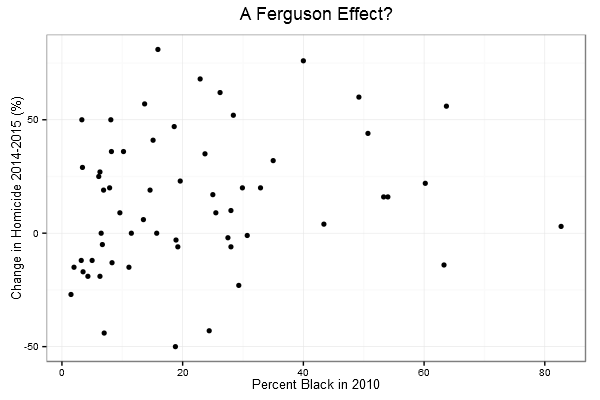In Search of a Ferguson Effect
Crime is rising. Data from FiveThirtyEight indicate that between 2015 thus far and the same period last year, homicides rose 16 percent in the nation's 60 largest cities (though data for one city, Anaheim, is missing). This may be a smaller increase than you'd think, but it's nothing to scoff at.
The question is why. Advocates of a "Ferguson Effect" say that intense criticism of police over the past year has emboldened criminals and cowed officers. Others point out that crime was rising in both St. Louis and Baltimore before the incidents that inspired outcry.
I came up with a simple test. The protests are heavily focused on race, so if there's a Ferguson Effect, cities with high black populations should have bigger increases in homicide — the protests presumably embolden white criminals less, and intimidate officers less when they're dealing with white suspects. Here's what I got when I plotted FiveThirtyEight's numbers against 2010 Census data on race:

It's striking that, with one exception (Memphis), every single city where homicide declined had a black population under 31 percent. (Jacksonville had a tiny decrease and is 30.7 percent black.) Inversely, every single city except Memphis with a black population above that mark saw homicide increase.
I did some basic statistical analysis as well, though as usual I should caution I'm a journalism major. I do get a statistically significant correlation between the two variables, though, as you'd expect from the image above, it's rather weak. There's a lot of randomness in crime statistics, especially city-level data covering less than a year, so I don't find the weakness surprising. If anything this mildly buttresses the case that something is going on.
(Details: p=.035, R-squared .075. The black-population numbers are incredibly skewed, so I took a logarithm to make them look more normal before running the data. Please e-mail or tweet me if you see something I should have done differently. Spreadsheet here.)
Robert VerBruggen is editor of RealClearPolicy. Twitter: @RAVerBruggen




